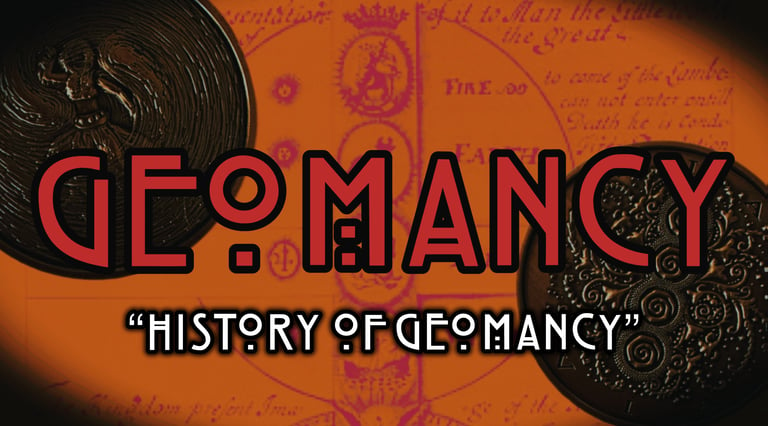History of Geomancy
Geomancy, an ancient divination practice, has deep historical significance that spans across different cultures and time periods. This post aims to explore the historical importance of geomancy and its impact on the understanding of the natural world and human destiny.
DIVINATION
Barry B.
6/1/20242 min read


Geomancy, an ancient divination practice, has deep historical significance that spans across different cultures and time periods. This post aims to explore the historical importance of geomancy and its impact on the understanding of the natural world and human destiny. By examining its origins, cultural adaptations, and enduring influence, we can gain a better appreciation of the profound role geomancy has played in shaping human history.
Geomancy, derived from the Greek words "geo" meaning Earth and "manteia" meaning divination, is an ancient practice that involves interpreting patterns and symbols found in the natural world to gain insight into the future. Dating back to at least the 8th century, geomancy has been embraced by various cultures, including the Ancient Greeks, Arabs, and Europeans during the Middle Ages. Its enduring popularity and adaptability reflect its ability to tap into universal human desires for understanding and control over destiny.
Origins and Cultural Adaptations
The origins of geomancy can be traced back to ancient Mesopotamia, where it was practiced as a form of divination known as "sand divination." This practice involved making marks or patterns in sand and interpreting their meaning. From Mesopotamia, geomancy spread to other ancient civilizations, such as Ancient Greece and Egypt, where it was adapted to suit their cultural beliefs and practices.
For example, in Ancient Greece, geomancy was associated with the Oracle at Delphi, where priestesses would interpret the patterns formed by the movement of sacred snakes. Similarly, in Ancient Egypt, geomancy was closely linked to the Nile River and its annual flooding patterns, which were believed to hold important messages from the gods.
Influence on Understanding the Natural World
Geomancy played a crucial role in helping ancient civilizations understand and interact with the natural world. By observing patterns in nature, such as the movements of animals, the positions of celestial bodies, or the patterns of wind and water, people sought to gain insight into the workings of the universe and their place within it.
For instance, in medieval Europe, geomancy was used to predict the outcome of battles and the success of crops by studying the patterns of clouds, the flight paths of birds, and the behavior of animals. This practical application of geomancy demonstrates its significance in shaping the decisions and actions of individuals and societies.
Influence on Human Destiny
One of the key reasons for the historical significance of geomancy is its role in understanding and influencing human destiny. By interpreting the patterns and symbols found in the natural world, geomancers believed they could gain insight into the future and make informed decisions to shape their lives accordingly.
Throughout history, geomancy has been employed to make important decisions, such as choosing a marriage partner, determining the outcome of legal disputes, or predicting the success of business ventures. This belief in the power of geomancy to influence human destiny highlights its enduring impact on society and individuals.
The historical significance of geomancy lies in its ability to provide individuals and societies with a sense of control and understanding over the natural world and their own destinies. By studying the patterns and symbols found in nature, ancient civilizations were able to tap into a deeper understanding of the universe and their place within it. From its origins in Mesopotamia to its adaptations in different cultures, geomancy has left a lasting imprint on human history, shaping beliefs, decisions, and actions across time and space.
Social Media
Copyright © 2025 The Interactive Psychic. All rights reserved. The content, design, and images on this website are protected by international copyright laws. Unauthorized reproduction or distribution of any materials found on this site is strictly prohibited. The trademarks, logos, and service marks displayed on this website are the property of The Interactive Psychic and other respective owners. By accessing this website, you agree to abide by the copyright laws and respect the intellectual property rights of The Interactive Psychic . Any unauthorized use or reproduction of the materials may result in legal action. Thank you for your cooperation and understanding in upholding the rights and creativity of The Interactive Psychic .